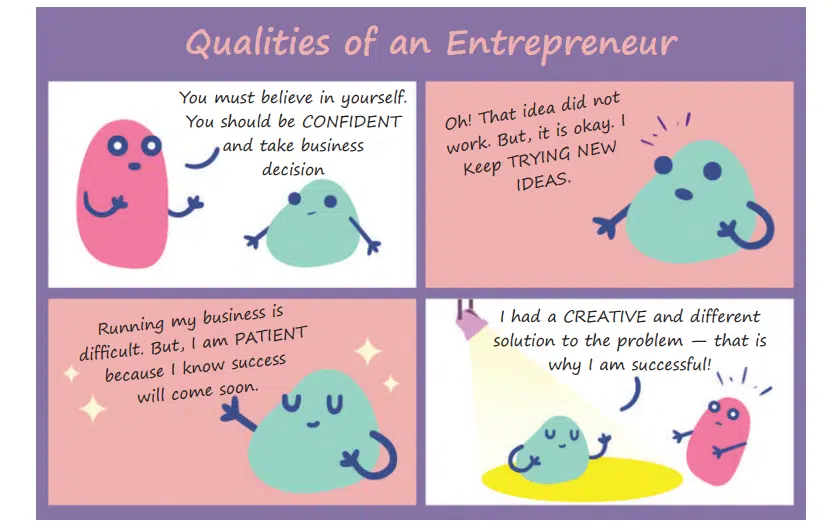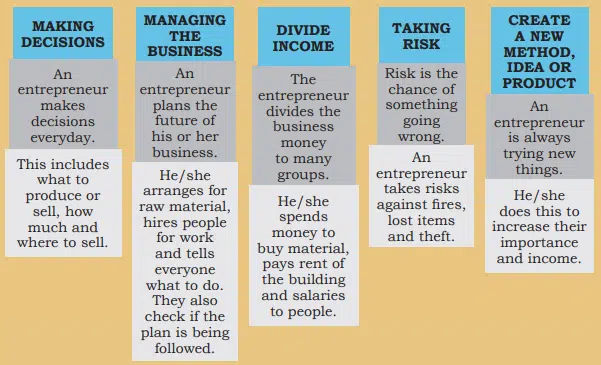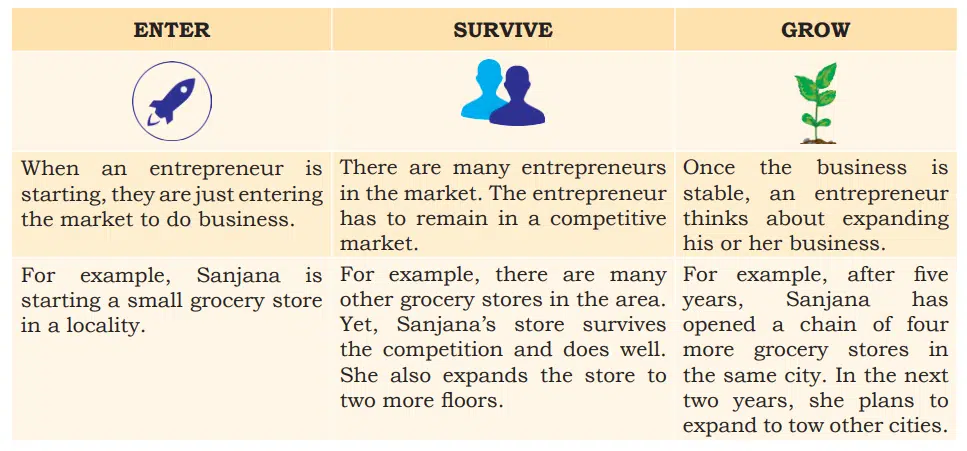Entrepreneurial Skills Class 10 Notes – Learning entrepreneur skills help to improve the creative thinking, business management and leadership. All the important Information are taken from the CBSE Textbook Employability Skills Class X Based on CBSE Board Pattern.
Entrepreneurial Skills Class 10 Notes
What do you mean by entrepreneurship?
Entrepreneurship is the type of self-employment where one is running a business to satisfy the needs of people and looking for ways to make the business better to make profits.
Qualities of Successful Entrepreneur –
- They are confident. They believe in themselves and their abilities.
- They keep trying new ideas in their business.
- They are patient.
- They are creative and think differently about business ideas.
- They take responsibility for their actions.
- They take decisions after thinking about them.
- They work hard.
- They do not give up when they face a difficulty.
Session 1: Entrepreneurship and Society
Who is Entrepreneur?
Self-employed people are those who start businesses to satisfy the needs of people and always trying to make his/her business better by taking risks and trying new ideas is an entrepreneur.
What do entrepreneurs do when they run their business –
- Fulfil Customer Needs: Entrepreneurs find out what people want and then create businesses to fulfill those needs.
- Use Local Resources: Entrepreneurs use the material and people available around them, to make products at low cost.
- Help Society: Entrepreneurs contribute positively to society, some entrepreneurs work towards saving the environment, some give money to build schools and hospitals. This way, the people and area around them becomes better.
- Create Jobs: Entrepreneurs make jobs by growing their businesses and doing well and helping to create employment opportunities in the community.
- Lower Price of Products: Increased competition among entrepreneurs can lead to lower prices for products, benefiting consumers.
- Spread Wealth: As entrepreneurs grow their business, the people working for them and in related businesses also grow. Hey, have more money to live a better-quality life.
Session 2: Qualities and Functions of an Entrepreneur
What are the different qualities of an entrepreneur?
- Hard working: Successful entrepreneurs believe on hard work and dedicate their maximum time to become successful businessman.
- Always Positive: Successful entrepreneurs have a positive mindset taking things in the correct manner and always be positive whenever he/she is making decisions in the business.
- Independent – Successful entrepreneurs are confident and running their businesses independently.
- Full of Energy: Successful entrepreneurs are always having a full of energy and participating actively to the business.
- Self-confident: Successful entrepreneurs are bold decision-makers and confident in their business.
Functions of an Entrepreneur –
- Making decisions – An entrepreneur can make decisions independently.
- Managing the business – An entrepreneur arranges the raw material, hires the people and tells the employee what to do.
- Divide income – The entrepreneur spends the money to buy material, give the salary and pay rent of the business.
- Taking risk – Entrepreneurs understand the risk and try to overcome the risk like risks against fires, theft, lost items etc.
- Create a new method, idea or product – An entrepreneur always applies new things to increase business and to increase income.
Session 3: Myths about Entrepreneurship
Myths about Entrepreneurship
- The misconception is that every business idea needs to be unique or special.
- The misconception we have is that a person needs a lot of money to start a business.
- A misconception we have is that only a person having a big business is an entrepreneur.
- A misconception we have is that entrepreneurs are born, not made.
Session 4: Entrepreneurship as a Career Option
A career is a line of work that a person takes for life. There are two ways a person can earn a living –
- Self-employment – Working for yourself, running your own business, example A graphic designer starting their own freelance design business.
- Wage employment – Working for someone else, earning a salary or hourly wage, example An office worker employed by a company, receiving a monthly salary.
A person who becomes an entrepreneur goes through a career process. This process is as follows:
Important link of employability skills class 10 notes
- Communication Skills Class 10 Notes
- Self-Management Skills Class 10 Notes
- Basic ICT Skills Class 10 Notes
- Entrepreneurial Skills Class 10 Notes
- Green Skills Class 10 Notes
Important links of employability skills class 10 MCQ
- Communication Skills Class 10 MCQ
- Self-Management Skills Class 10 MCQ
- Basic ICT Skills Class 10 MCQ
- Entrepreneurial Skills Class 10 MCQ
- Green Skills Class 10 MCQ
Importan link of employability skills class 10 questions and answers
- Communication Skills Class 10 Questions and Answers
- Self-Management Skills Class 10 Questions and Answers
- Basic ICT Skills Class 10 Questions and Answers
- Entrepreneurial Skills Class 10 Questions and Answers
- Green Skills Class 10 Questions and Answers
- Green Skills Class 10 Questions and Answers
Entrepreneurial Skills Class 10 Notes FAQs
What is entrepreneurial skills class 10?
Abilities like creativity, risk-taking, and leadership needed for starting and managing a successful business.
What is meant by entrepreneur Class 10?
A person who starts and runs a business to make a profit, known for innovation and risk-taking.
What is entrepreneur class 10 computer?
In computer class, learning how entrepreneurs use technology for business, including digital marketing and online platforms.
What are the stages of entrepreneurship class 10?
Idea Generation, Feasibility Analysis, Business Planning, Start-up, Operation and Growth, Maturity or Exit.
Entrepreneurial skills class 10 notes pdf download?
Entrepreneurial skills class 10 notes pdf you can download from the cbseskilleducation.com website, the topic related to self-management skills as per the CBSE syllabus it given point wise and easy to understand.
Entrepreneurial skills class 10 questions and answers
Yes, you can read questions and answers from the given link, all questions are important.
Entrepreneurial skills class 10 notes questions and answers pdf
Entrepreneurial skills class 10 notes pdf you can download from the cbseskilleducation.com website, the topic related to self-management skills as per the CBSE syllabus it given point wise and easy to understand.
Entrepreneurial skills class 10 notes questions and answers
Yes, you can read notes, questions and answers from the given link, all questions are important.
Entrepreneurial skills class 10 mcq
Yes, you can read MCQs from the given link, All MCQs are important.
Entrepreneurial skills class 10 notes readers venue
All the information of entrepreneurial skills is given on the website, you can read the information, mcqs and questions and answers.
Entrepreneurship class 10 pdf
Entrepreneurial skills class 10 notes pdf you can download from the cbseskilleducation.com website.
Entrepreneurial skills class 10 ppt
Entrepreneurial skills class 10 ppt you can download from the cbseskilleducation.com website.
Entrepreneurship skills class 10 notes pdf
Entrepreneurship skills class 10 notes pdf, if you want then please request in my mail anuraganand2017@gmail.com, i will try to be available as soon as possible.
Disclaimer: We have taken an effort to provide you with the accurate handout of “Entrepreneurial Skills Class 10 Notes“. If you feel that there is any error or mistake, please contact me at anuraganand2017@gmail.com. The above CBSE study material present on our websites is for education purpose, not our copyrights. All the above content and Screenshot are taken from Employability Skills Class 10 CBSE Textbook and Support Material which is present in CBSEACADEMIC website, This Textbook and Support Material are legally copyright by Central Board of Secondary Education. We are only providing a medium and helping the students to improve the performances in the examination.
For more information, refer to the official CBSE textbooks available at cbseacademic.nic.in




Thank you great notes
this is very good website to learn form onlineeeeee
ok good siteeee////?????????????????????????????????????????????????????????????????
My teacher uses this site
my also
Nice
nice
Best short notes for IT
I was searching for so long time but no one really cares about this subject
Got this reference from an youtuber(ayushi singh ths best senior ????✨).
????????
Hii:)
Please also add there mcq’s where all the student should be pratice of that for there IT/AI exam…..
????????????
MCQS are available just search and add on the name of this website .